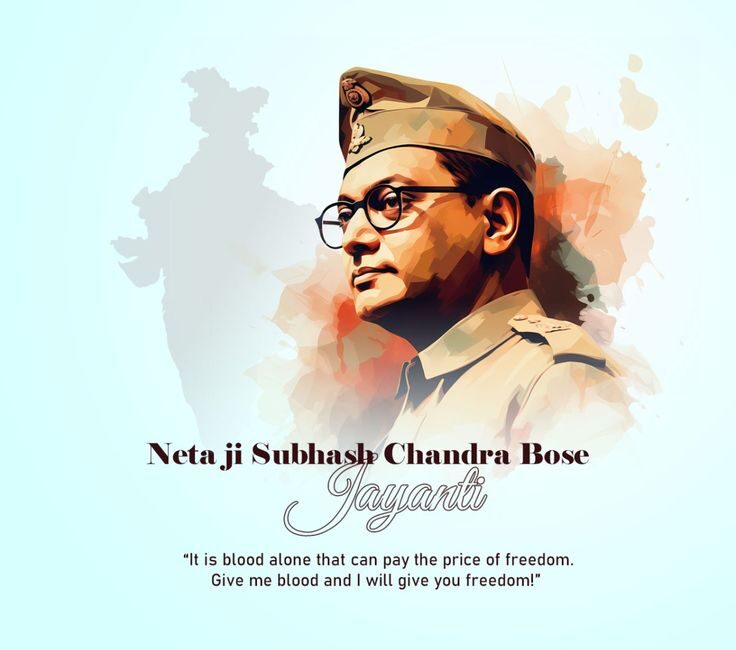🇮🇳 Introduction: A Day to Salute the Undying Spirit of Patriotism
Netaji Subhas Chandra Bose Jayanti, observed annually on January 23, is a tribute to one of India’s most iconic freedom fighters, whose life was a blend of unmatched courage, charisma, intellect, and selfless patriotism.
- 📜 History of Netaji Subhas Chandra Bose Jayanti
- 📅 Timeline of Netaji Subhas Chandra Bose and His Legacy
- 🧠 Fascinating Facts About Netaji Subhas Chandra Bose
- ❓ Frequently Asked Questions (FAQs)
- 1. Why is Netaji Jayanti celebrated on January 23?
- 2. What is “Parakram Diwas”?
- 3. What is Netaji most famous for?
- 4. Was Netaji ever the Prime Minister of India?
- 5. Is Netaji’s death confirmed?
- ✊ Significance of Netaji Subhas Chandra Bose Jayanti
- 💥 1. Celebrates Fearless Patriotism
- 🧭 2. Promotes Revolutionary Thinking
- 👨👩👧👦 3. Encourages Youth Leadership
- 🕊️ 4. Honors Unsung Heroes
- 🎉 Observance and Celebrations
- 💬 Inspiring Wishes & Quotes
- ✅ Important Points to Remember
- 🌞 Importance in Our Daily Lives
- 🌍 Importance in Society
- 🧘♂️ Conclusion: The Unfinished Chapter That Fuels Us
Also known as “Parakram Diwas” (Day of Valor), this day reminds us of the uncompromising ideals and dauntless leadership that Netaji demonstrated in India’s struggle for independence.
Let’s dive deep into the history, key facts, timeline, observance, FAQs, and importance of this special day that ignites patriotism in every Indian soul.
📜 History of Netaji Subhas Chandra Bose Jayanti
Subhas Chandra Bose was born on 23rd January 1897 in Cuttack, Odisha, into a well-educated and prominent Bengali family. From an early age, he displayed extraordinary academic excellence and a strong sense of nationalistic fervor.
After clearing the Indian Civil Services Exam in England, he resigned from the British job in 1921, moved by the oppressive colonial rule, and plunged into India’s freedom movement.
He later became a prominent leader of the Indian National Congress, even becoming its President in 1938 and 1939, but ideological clashes with Mahatma Gandhi led him to form the Forward Bloc.
Most notably, he founded the Indian National Army (Azad Hind Fauj) with the cry “Give me blood, and I will give you freedom”, and fought alongside Axis powers during WWII to liberate India from British rule.
📅 Timeline of Netaji Subhas Chandra Bose and His Legacy
| Year | Event |
|---|---|
| 1897 | Born in Cuttack, Odisha on January 23 |
| 1921 | Resigned from Indian Civil Services |
| 1938 | Became President of Indian National Congress |
| 1942 | Escaped house arrest, traveled to Germany |
| 1943 | Formed the Indian National Army in Singapore |
| 1945 | Allegedly died in a plane crash (still debated) |
| 2021 | Government of India declared January 23 as “Parakram Diwas” |
🧠 Fascinating Facts About Netaji Subhas Chandra Bose
He was titled “Netaji” (Respected Leader) by German and Indian soldiers in 1942.
Netaji traveled through Afghanistan, Russia, and Germany in disguise to seek global support for India’s freedom.
He formed Azad Hind Radio to broadcast his revolutionary speeches.
Indian National Army (INA) had both male and female battalions, including the Rani of Jhansi Regiment, led by women.
He once said, “Freedom is not given—it is taken.”
His death in 1945 remains a mystery, with several investigations and theories challenging the official claim of a plane crash.
He is one of the few Indian leaders to be honored in Japan, Germany, and Southeast Asia.
❓ Frequently Asked Questions (FAQs)
1. Why is Netaji Jayanti celebrated on January 23?
Because Netaji was born on January 23, 1897, in Cuttack, Odisha. The date was later officially recognized as Parakram Diwas by the Indian Government in 2021.
2. What is “Parakram Diwas”?
“Parakram Diwas” means “Day of Valor”, declared by the Government of India to commemorate Netaji’s courage and leadership in India’s freedom struggle.
3. What is Netaji most famous for?
He is most famous for leading the INA, his defiant stance against British rule, and his bold international diplomacy during World War II to liberate India.
4. Was Netaji ever the Prime Minister of India?
No, but he was the Supreme Commander of the Provisional Government of Free India (Azad Hind Government) formed in exile in 1943.
5. Is Netaji’s death confirmed?
Netaji is said to have died in a plane crash in Taiwan on August 18, 1945, but many believe he survived, and several investigations have remained inconclusive.
✊ Significance of Netaji Subhas Chandra Bose Jayanti
💥 1. Celebrates Fearless Patriotism
Netaji symbolizes fearlessness and uncompromising nationalism—a rare blend of bravery and intellect.
🧭 2. Promotes Revolutionary Thinking
Unlike passive resistance, Netaji’s ideology teaches assertive action, bold decisions, and taking responsibility for change.
👨👩👧👦 3. Encourages Youth Leadership
His legacy inspires youth to be active leaders, thinkers, and nation-builders rather than passive citizens.
🕊️ 4. Honors Unsung Heroes
The INA and Forward Bloc were brutally sidelined in colonial narratives—this day brings them back into historical focus.
🎉 Observance and Celebrations
🏛️ Government Programs
Flag hoisting ceremonies
Cultural shows, parades, and documentaries
Tribute events at Red Fort, Netaji Bhawan (Kolkata), and INA museums
📚 Schools & Colleges
Debates, essay competitions, and patriotic speech contests
Students dress up as Netaji and perform enactments of INA slogans
📺 Media & Online Platforms
Documentaries, podcasts, and tribute videos trend on YouTube, X (Twitter), and Doordarshan
💬 Inspiring Wishes & Quotes
“On this day of courage, let us salute Netaji’s indomitable spirit. Jai Hind!”
“Remembering the true lion of India—Netaji Bose, who roared against the British empire.”
“Freedom is not given—it is taken. Let us live up to Netaji’s legacy this Parakram Diwas.”
“A tribute to the man who dared the impossible. Happy Netaji Jayanti!”
✅ Important Points to Remember
Netaji was a visionary far ahead of his time, advocating equality, military strength, and unity.
He challenged Mahatma Gandhi’s non-violence with valid revolutionary alternatives.
His efforts laid the psychological groundwork for Indian independence, even if his INA failed militarily.
He promoted secularism and inclusivity, with his army comprising Hindus, Muslims, Sikhs, and Christians.
He continues to be revered as an icon in West Bengal, Odisha, Northeast India, and even abroad.
🌞 Importance in Our Daily Lives
🚀 Motivation for Youth
Netaji’s life encourages youth to question, explore, and fight for justice, even in modern struggles—be it corruption, inequality, or social injustice.
🌱 Personal Development
His emphasis on discipline, knowledge, courage, and dedication to the motherland can guide our personal and professional lives.
📣 Civic Engagement
Netaji’s call, “Tum mujhe khoon do, main tumhe azadi doonga”, reminds us that freedom comes with responsibility and sacrifice—a message still valid in today’s democracy.
🌍 Importance in Society
Preserves India’s revolutionary legacy beyond the Gandhian lens.
Acts as a symbol of unity among religious and regional diversities.
Offers alternative historical perspectives to mainstream colonial narratives.
Reinforces national pride among diaspora communities worldwide.
🧘♂️ Conclusion: The Unfinished Chapter That Fuels Us
Netaji Subhas Chandra Bose is more than just a historical figure—he is a living idea, a torchbearer of courage, and a soul who shook the empire with his roar.
His story may remain incomplete in historical documentation, but his impact is eternal. The celebration of his Jayanti each year is a renewal of our pledge to build a stronger, freer, and more unified India.
So let us not just remember him, but live by his ideals, question what’s wrong, and rise with the fire he lit in the hearts of millions.








